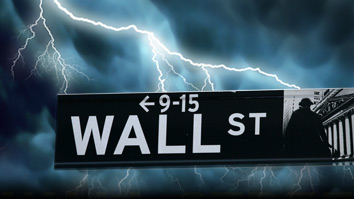A shock from the House
來自眾議院的驚雷
The House of Representatives rejects the $700 billion bail-out plan
美國眾議院否決了7000億美元的救援計劃
IT WOULD have been one of the most unpleasant laws that Congress had found itself writing so close to an election. Devoting $700 billion of taxpayers’ money to rescuing the country’s least popular industry was clearly not a vote winner. That Democratic and Republican congressional leaders held their noses this weekend and came up with the Emergency Economic Stabilisation Act was encouraging evidence that they appreciate the gravity of the financial crisis. But with a vote of 228 to 205, the House rejected it. World stockmarkets promptly slumped. At one point the Dow Jones industrial average had fallen than 700 points, its biggest intraday drop ever. The oil price slumped by $10 to less than $97 a barrel.
這可能是在如此靠近大選前國會最不愿簽署的法案之一。將納稅人的7000億美元用于拯救這個國家最不受歡迎的行業顯然不會成為選舉勝利者。民主共和兩黨國會領袖在上周末雖不情愿但又不得不努力商討并且提出一個緊急經濟穩定法案,這表明他們正在重視金融危機的影響。但是眾議院卻以228對205否決掉了這個提案。世界股票市場立遭重挫。道瓊斯平均工業指數最低下跌700多點,是其單日內歷史最大跌幅。油價暴跌10美元至不到每桶97美元。
The House voted against the bill despite the best efforts of the two candidates to be president. “This is something that all of us will swallow hard and go forward with,” John McCain had said. Barack Obama had added that “What we can’t do is do nothing.” As it stood on Monday, that was precisely what the House had chosen to do. The White House issued a statement expressing its severe disappointment and promising to get an economic team together to consider its next steps. It remains possible that the House will vote again. The Senate had been due to vote later in the week.
盡管兩位候選人做出最大努力使這項法案通過,國會依然否決了此法案。麥凱恩曾說:”我們所有人所必須做的就是克服艱難,闊步向前。”奧巴馬又加上:”當前我們絕不能無所作為。”然而以星期一的情況來看,眾議院正是決定要”無所作為”。白宮對此發表聲明表示非常失望并且保證會召集其經濟執政團隊以商討下一步行動。眾議院仍有再次投票表決的可能,而參議院將在本周晚些時候對此投票表決。
The bill had been widely expected to pass. Legislators from both parties wrung concessions from Hank Paulson, the treasury secretary, to provide necessary political cover. But voters seemed unconvinced. In a USA Today/Gallup Poll conducted on September 24th just 22% favoured Mr Paulson’s proposal while 56% wanted something different; only 11% preferred that no action be taken.
這個方案曾被廣為期望能夠通過。來自兩黨的議員從財政保爾森那里榨取一些妥協來向公眾提供必要的政治籍口。但是選民顯然沒有被說服。在9月24日,《今日美國》和蓋洛普進行的民意調查顯示,只有22%的被調查者贊同保爾森的提案,而56%的人希望其它的方案,只有11%的人選擇不要采取任何行動。
By legislative standards Congress moved at light speed after Mr Paulson and Ben Bernanke, the Federal Reserve chairman, proposed action on September 18th, warning of serious doom and gloom if nothing were done. In the past week the financial crisis has erupted in even more dangerous forms globally. The interbank-funds market has seized up and even the most creditworthy corporate and financial firms are paying punitive rates. Last week Washington Mutual became the largest-ever American bank to fail. In Europe, three countries had to come to the rescue of Fortis, a Belgian banking group, and Britain did the same with a mortgage lender, Bradford & Bingley. And on Monday Citigroup agreed to buy most of the assets of Wachovia, another beleaguered American bank, in a deal brokered by regulators.
在保爾森和美聯儲主席伯南克于9月18日警告如果不采取行動將會有極為嚴重的災難和蕭條后,國會的立法程序開始以光速運作。在過去的一周里,金融危機以更加危險的方式在全球爆發出來。銀行間基金市場陷入停滯,許多信譽卓越的公司和金融機構不得不支付懲罰性的利率。上周,華盛頓互惠銀行成為美國歷史上最大的倒閉銀行。在歐洲,三個國家開始營救比利時的富通銀行。而英國也開始拯救其最大的抵押貸款機構–布拉德福德賓利集團。周一,在監管者的協調下,花旗集團也同意購買陷入困境的美聯銀行的大部分資產。
The new law would have provided the Fed with an additional tool for combating the latest stage of the crisis: from October 1st it would have paid interest on reserves that banks maintain at the Fed. This would have let it pump almost unlimited cash into the money market without fear of interest rates falling to zero, Japanese-style.
新的法案(如果通過的話)將給美聯儲對付最新階段的危機提供了一個新的工具:從10月1日開始,美聯儲將會給銀行存在美聯儲的資金付給利息。這就可以使其給貨幣市場注入無限多的現金而不必擔心陷入利率為零的日本模式。
Mr Paulson or his successor would have been given $250 billion immediately, $100 billion more at the president’s discretion and $350 billion upon Congress’s approval. The Troubled Asset Relief Programme, or TARP, would be allowed to buy mortgage-backed securities, whole loans (those not bundled into pools) and, in consultation with the Federal Reserve chairman, anything else necessary to stabilise the financial system. That includes taking control of entire companies. Mr Paulson said on Sunday that would get the power to avert “the potential systemic risk from the disorderly failure of a large financial institution,” implying the ability to bail-out a company while punishing its owners, as was done with Bear Stearns, Fannie Mae, Freddie Mac and AIG. Given the frequency with which institutions are collapsing, he would have been keen to invoke that power soon.
保爾森和他的繼任者會被立即給予2500億美元,還有1000億美元的使用依據總統批準,而另外3500億美元的使用須經國會批準。問題資產救援計劃(TARP)將會允許購買抵押債券,全額貸款(沒有沒打包進入證券市場的貸款),以及其它任何對穩定金融系統有需要的資產(這需要與美聯儲主席商討)。保爾森周日表示將會獲得阻止”來自大型金融機構混亂倒閉的潛在性系統風險”的力量,這意味著包括取得對問題公司的全權控制的權力,類似處理貝爾斯登,兩房和美國國際集團的情況。在連續遭受金融機構垮臺打擊后,保爾森迫切需要盡快獲得這個權力。











